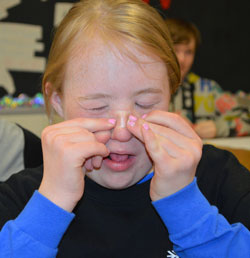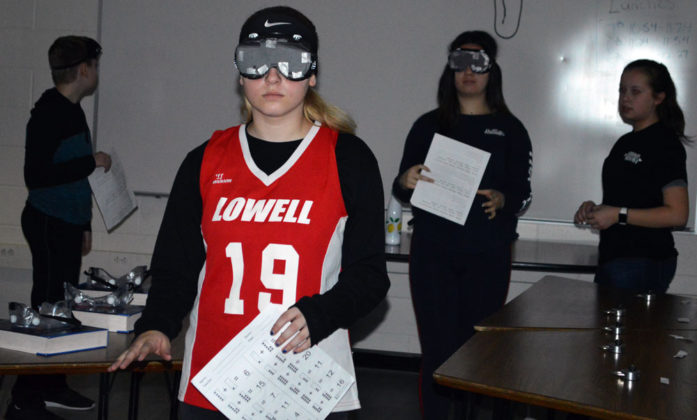What’s it like for a student who has autism to take a math test?
Students at Lowell Middle School recently got the chance to experience the sensory overload that can hamper concentration for those who have the condition.
With pieces of tape across their noses and mouths filled with pieces of chewy candy, groups of seventh- and eighth-graders attempted to take a written test as a clock ticked, a door slammed, staplers stapled, pencils sharpened, papers rustled, noses were blown and a box of markers crashed to the floor.
Nobody finished the test.
“Every noise that sounds insignificant to us is overwhelming for them,” explained special education teacher Deb Greenhoe.

Promoting Understanding
It was one of three simulations students throughout the school were invited to take part in as part of an activity run by students in the school’s ARROWS class, which started this year and is led by Greenhoe and English teacher Stacy Verburg. The goal is to promote compassion, understanding and friendship among general education students and those with cognitive impairments.
As part of a visual impairment simulator, students wore goggles and attempted to open a combination lock, read a dictionary with very small print and navigate through a crowded classroom.
“It makes doing stuff at school that much harder,” said eighth-grader Drew Veldman. “Or even at home, imagine trying to zip up your coat, or even eat breakfast.”

They also clicked through computer screens to better understand how those with learning disabilities such as dyslexia experience school.
“Imagine what it would be like trying to write an essay, and having to type the same sentence over and over to get the letters in the right order,” said eighth-grader Courtney Witten.
Students submit applications to be admitted to the year-long ARROWS class. Seventh-grader Mason Fuentes said he wanted to be part of it “because I had trouble talking to new people.”
Said Verburg: “What I am most excited about are the relationships that have formed among the ARROWS students that have gone beyond the classroom.”
What Mason has learned from being involved in ARROWS: “Nobody’s perfect,” he said.
CONNECT












